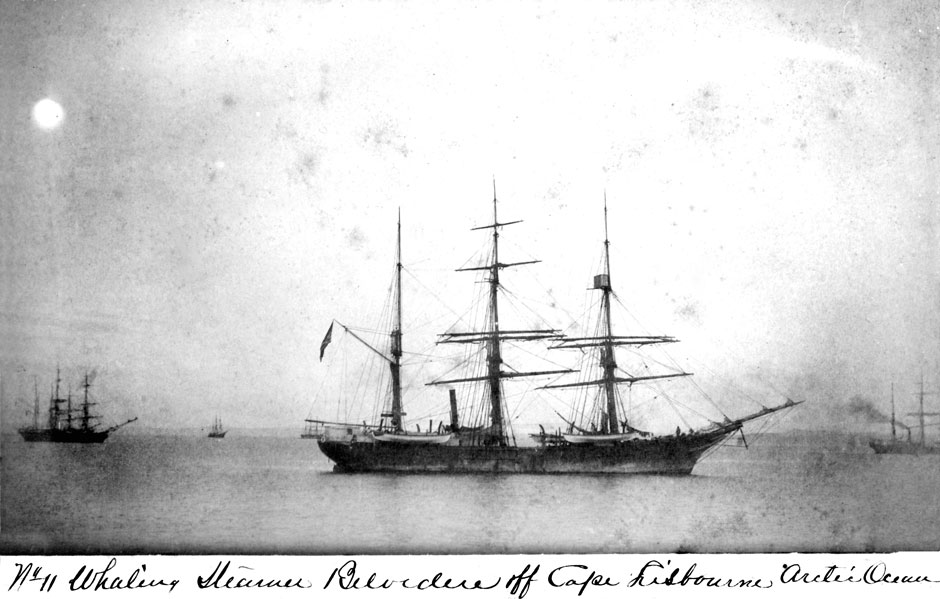【History Archives】
2025-06-25 23:34:35
745 views
628 comments
North to the Past,History Archives and Other News
On the Shelf

The whaling steamer Belvedere, Cape Lisburne, Arctic Ocean, ca. 1886. Pictured in Steaming to the North. Photo via NYRB
- Ian Frazier on Steaming to the North, a new book of photographs that “provides another of the poignant rear-view-mirror visions of ourselves and our environment in which Americans specialize.” The book charts the journey of “the U.S. Revenue Cutter Bear, a 198-foot, reinforced-hull vessel powered by both steam and sail.” The Bearpatrolled the seas of Alaska circa 1886, when it was a new American territory. These photos of it were “rediscovered in the 1970s under a porch in New Hampshire.”
- Cicero may have been a master orator—but no rhetoric could rescue his lame advice for how to spend your twilight years. “He comes over as a humorless and self-satisfied bore when he writes that ‘the fruit of old age is the remembering and amassing of fine accomplishments’ … Besides being unduly platitudinous, it makes generally for unhappy reading … Apart from sitting on the sofa thinking smugly about all your great achievements, Cicero recommends taking up agriculture.”
- Last week we featured Ron Arad’s crushed cars. Now there’s a video that demonstrates how he crushes them, exactly. (Spoiler: it involves force.)
- Geoff Dyer on Raymond Williams, “a hero of the 1968 generation”: “Williams’s legacy and influence, which had once seemed assured, have gradually shrunk … it is necessary to do two things that might appear contradictory: to concede that, with the exception of Border Country, the fiction to which he devoted so much energy was dull; and to free the rest of his work from the once-modish tundra of cultural studies, let alone the pack ice of theory. Perhaps then he will be read with the same passion and adoration that still attends the discovery of John Berger.”
- On the intellectual character (or lack thereof) of conspiracy theorists: “The problem with conspiracy theorists is not, as the U.S. legal scholar Cass Sunstein argues, that they have little relevant information. The key to what they end up believing is how they interpretand respond tothe vast quantities of relevant information at their disposal … this is fundamentally a question of the way they are.”
Search
Categories
Latest Posts
Faux-Pas at MOMA
2025-06-25 22:15For the first time ever, a non
2025-06-25 22:15Police point out robber's major fail in humorous Facebook post
2025-06-25 21:59The France of No Tomorrow
2025-06-25 21:27Popular Posts
American Mirage
2025-06-25 23:26Twitter CEO Jack Dorsey asks Twitter for help with his two jobs
2025-06-25 21:59Don Lemon got real (drunk) on New Year's Eve
2025-06-25 21:58Foul Shot
2025-06-25 20:48Featured Posts
Stranger than Fiction
2025-06-25 23:17BHIM app will replace all cash transactions in India: PM Modi
2025-06-25 21:31Twitter CEO Jack Dorsey asks Twitter for help with his two jobs
2025-06-25 21:30Beyond Belief
2025-06-25 20:54Popular Articles
The Perishable Politician
2025-06-25 23:11Apple could start manufacturing iPhones in India by April 2017
2025-06-25 22:20Alabama, Shaken
2025-06-25 22:11Newsletter
Subscribe to our newsletter for the latest updates.
Comments (795)
Fashion Information Network
Sméagol in the Sky
2025-06-25 23:26Information Information Network
From Bowie to Solange: Here are the top 10 albums of 2016
2025-06-25 23:24Future Information Network
The harrowing tale of Ryan Seacrest getting stuck in a Times Square elevator
2025-06-25 22:09Star Sky Information Network
Rare nationwide cold snap to ring in the New Year across U.S.
2025-06-25 21:12Exploration Information Network
The Thou of Zadie Smith
2025-06-25 21:03